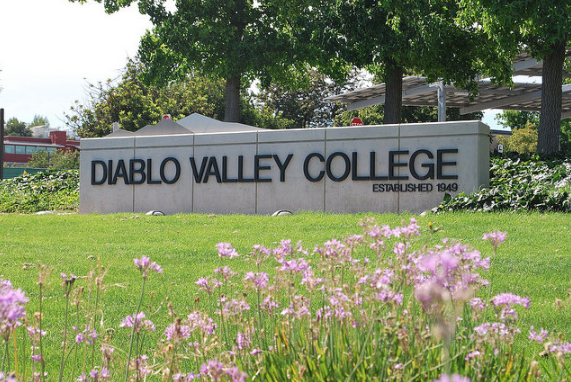Greening DVC: Progress and Challenges in Building a More Sustainable Campus

Lindsey Barrows, a 22-year-old part-time student, said she finds the DVC campus more sustainable compared with other schools she has attended. (The Inquirer file photo).
April 28, 2020
As schools across the country work to address environmental issues, in an era of growing climate concerns, Diablo Valley College is also taking strides to do its part. Earlier this semester, before the campus closed due to fears over the spread of the novel coronavirus, DVC’s Sustainability Committee sent out a newsletter encouraging greater use of public transportation by students – as well as carpooling and use of zero-emission vehicles – as a way to reduce the school’s carbon footprint.
David Hagerty, chair of the Sustainability Committee, said he believes it’s important to reduce one’s carbon footprint because of the “long-term effects on the Earth’s climate and its ecosystems.”
Over the years, DVC has made consistent attempts to be more eco-friendly, for example by installing solar panels on the Life and Health Sciences building roof, and in parking lots one, three and four.
According to Sharrie Bettencourt, co-chair of the Sustainability Committee, the commons, student services and cafeteria buildings are all LEED gold certified, making them highly energy-efficient, cost-saving “green” buildings. There have also been many more recycling bins installed around campus compared to a decade ago, with additional ones added in recent months.
The DVC Drama Department has committed to sustainability, from making costumes out of donated clothing and fabric to constructing sets from repurposed materials. According to the DVC sustainability tour map, there are two electric car charging stations in parking lot four, with plans to install three more stations. Plus, solar panels are generating energy in parking lots adjacent to the library, further reducing the school’s dependence on fossil fuels.
The book center uses 100 percent reused packing and boxes, with coffee shop cups made from 70 percent recycled materials. DVC has also established a green waste composting program where food and food-soiled materials will be composted to provide rich soil as a way to fertilize the landscape of the campus.
Lindsey Barrows, a 22-year-old part-time student, said she finds the campus more sustainable compared with other schools she has attended.
“Just walking around campus, it’s one of the cleaner campuses that I’ve been to because there are so many receptacles for trash, so I think that’s really great,” said Barrows. “I don’t see a lot of students walking around with plastic water bottles…Everything looks pretty good.”
But for other students, DVC is still neglecting important areas of sustainability – such as providing better filtered water so that students aren’t forced to purchase so many new plastic bottles.
Emma Sonas, a biology major, said the water she drinks from DVC fountains doesn’t taste like it’s been filtered enough, and it’s adding to unnecessary student waste.
“I think the fact that there’s not clean water for students to drink really drives people to the bookstore to buy bottled water, bottled tea,” said Sonas, and “pretty much everything sold in there is in plastic.”
She said she wants to see all campus water fountains replaced with more water bottle refill stations – which currently only exist at the cafeteria, library, mathematics building and student union. “It would be really easy to put these in place around campus instead of the water fountains,” said Sonas. “Nobody wants to drink disgusting water.”
Barrows also said that there are not enough water refill stations and she would like to see them more throughout the campus.
School officials could not confirm whether any new refill stations would be installed, or when.
Some students have also criticized the way waste is managed at DVC’s San Ramon campus, where trash and recycling bins exist but there are no bins for organic waste. Campus administration said it plans to investigate this concern as well.
Bettencourt said that while the school is “definitely taking action now more than ever,” it is still lagging behind some other institutions.
Las Positas College in Livermore, for example, has nine water refill stations located across the campus. At the university level, UC Berkeley has been recognized among the most environmentally sustainable colleges in the country, committing to a ban on plastics and diverting 54 percent of its municipal solid waste stream to recycling, composting or reuse.
According to Bettencourt, more can still be done to make DVC sustainable in the future. “I feel like we’re basically ten years behind where everybody else is,” she said.
The school is now looking at ways to tackle the high use of plastics on campus, while also in talks of developing a DVC carpooling app as a possibility to help students and staff reduce their carbon footprint.
“Greenhouse gases affect everyone. [Climate change] does not discriminate,” said Bettencourt. “We have to work together… to develop ways to improve our methods of reducing emissions, because if we don’t things will continue to get worse.”







































































Joel Matthews • Apr 30, 2020 at 10:08 am
Hi Aryana,
Thanks for the article. You might want to add HVAC energy usage to your agenda. The heating and cooling of many buildings, especially the ET facilities where I teach, continues even when unoccupied. Maybe something can be done about this.
J. Matthews